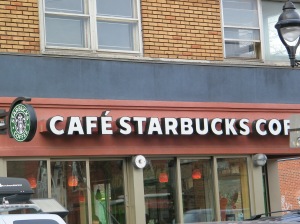I just recently returned home from a trip to Canada where I visited Toronto, Ottawa and Montreal with the hopes of understanding more what the dynamics are in Canadian culture and politics–specifically relating to Canadian patriotism. I got to go, funded by Johns Hopkins, thanks to a fellowship I was awarded as an incoming freshman.
I learned a lot of interesting things. I remarked to a Canadian that I feel so ignorant that I had never known any of these things before about their country. He replied that frankly that sentiment is very common. He said Canadians view themselves through the metaphor of ‘an elephant and a mouse sleeping together in the same bed’ where the elephant never really pays any attention to the mouse, but the mouse is aware of the elephant’s every move.
Canadian patriotism is very interesting because it turns out it’s quite difficult to define what it means to be a Canadian. I asked everyone that I talked to what, in their minds, is a common ideal or symbol that Canadians unite over. Time and time again they sheepishly smiled and said, “That we’re not American.”
I learned of this constant identity struggle Canadians have, where they want a distinct culture and identity, but the flood of American influence can’t be denied. Canada is a very big country with a relatively small population, and at least 90% of Canadians live within 200 miles of the border of America. American music blasts in their clubs, American businesses are established in their cities, and even American politics are often found on their front pages and news stations. Even if one makes the choice to watch Canadian TV, such as CBC, CTV, Global or Canadian specialty channels, American content will be well represented on those too. The book stores are filled with American magazines and authors. Fast food like Burger King, Pizza Pizza, Pizza Hut, Taco Bell, KFC, Starbucks, Quiznos, McDonalds and Wendy’s can all be found in Canada.
Canadians try and combat this issue with a variety of legislation meant to help Canadian businesses and artists and the like. It’s just often hard to compete with the power of big American chains like Costco, Sears etc. Target is expected to open 135 stores in Canada beginning in 2013 which retailers are really worried about.
While this is a problem throughout the entire country, the quest to distinguish itself from America seems even greater in Quebec, where the preservation of a french culture remains a constant struggle. The famous ‘Bill 101’ requires that signs in Quebec have to be listed in French, and if there is English on the sign French has to come first and dominate the sign. It also says that for companies that hire 50 or more employees, they are required to show that French is the primary language in the workplace in order to receive government contracts or funding. In some cases, with American chains, they might try to add a French word somewhere in the sign since they are not legally allowed to change the name of the industry.
I learned that there used to be a strong separatist movement that wanted Quebec to break off from the rest of Canada and form its own country. While there are still some separatist, super-nationalist Francophones who dream of a separate Quebec living there today, I gathered that the movement has generally died down in the past couple decades, and younger Canadians living in Quebec seem to recognize the global advantage to mastering English, as well as living in their beloved French culture.
So a big thing I must touch on in this post is ‘multiculturalism.’ This is a huge aspect of Canadian identity. Because Canada is made up of French peoples, British peoples, and First-Nations [what we’d call Native Americans], Canadians like to say they are a ‘mosaic’ rather than the American ‘melting pot.’ I met some people on my trip who definitely felt that this metaphor was true, and that Canada does a much better job than the US in helping people maintain different cultures and identities. The flip side is, I met a fair number of Canadians who told me that the metaphor is bullshit, and Canada hides behind these narratives that they are “peacekeepers” and “tolerant” when in fact their minorities suffer from prejudice and discrimination too. I’m not totally sure what I believe, but I will say I felt Canadians too often tried to say that while there are many diverse cultures in Canada, Americans are simply one blended American culture. I find this inaccurate, there are pockets of ethnic culture throughout the country. From the Chinatowns, to the Little Italy’s, to the Jewish communities, to the Christian towns, to the Irish villages to the Latino areas. There was definitely some oversimplification of what “Americans” are like.
With regards to multiculturalism and patriotism, so much of how Canadians view and understand themselves is based on what province they’re from. [There are ten provinces and three territories.] In Canada, I met people who would tell me how while multiculturalism was revered in some provinces, Quebec for example has a lot of bad feelings towards Pierre Elliott Trudeau, the Prime Minister of Canada who enacted the multicultural legislation. [The Quebecers felt that in order to elevate other cultures and identities to an equal playing field in Canada, their French culture suffered a loss of status and prestige that they had been very proud of.]
This is pretty similar to how the American South often has very different historical understandings of what happened in the Civil War and antebellum period. Some people will celebrate Stonewall Jackson Day instead of MLK day, or refer to the Civil War as “The war of Northern Aggression” or venerate Confederate soldiers that are immortalized in statues in parks.
It’s interesting to think about what a national narrative can mask.



